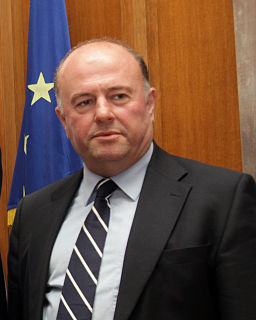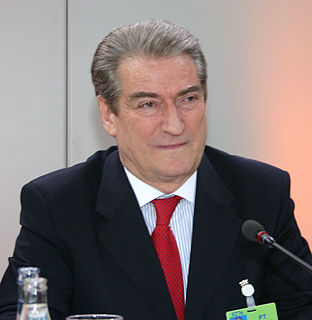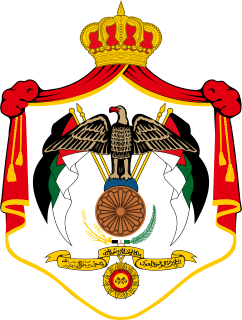A local government is a form of public administration which, in a majority of contexts, exists as the lowest tier of administration within a given state. The term is used to contrast with offices at state level, which are referred to as the central government, national government, or federal government and also to supranational government which deals with governing institutions between states. Local governments generally act within powers delegated to them by legislation or directives of the higher level of government. In federal states, local government generally comprises the third tier of government, whereas in unitary states, local government usually occupies the second or third tier of government, often with greater powers than higher-level administrative divisions.
Albania is a unitary parliamentary constitutional republic, where the President of Albania is the head of state and the Prime Minister of Albania the head of government in a multi-party system. The executive power is exercised by the Government and the Prime Minister with its Cabinet. Legislative power is vested in the Parliament of Albania. The judiciary is independent of the executive and the legislature. The political system of Albania is laid out in the 1998 constitution. The Parliament adopted the current constitution on 28 November 1998. Due to political instability, the country has had many constitutions during its history. Albania was initially constituted as a monarchy in 1913, briefly a republic in 1925, then it returned to a democratic monarchy in 1928. It later became a socialist republic until the restoration of capitalism and democracy in 1992.
In many countries, a mayor is the highest-ranking official in a municipal government such as that of a city or a town.

A municipality is a local government unit (LGU) in the Philippines. A municipality is also usually called town in its archaic term, since municipalities have the functions of a town since its inception. They are distinct from cities, which are a different category of local government unit. Provinces of the Philippines are divided into cities and municipalities, which in turn, are divided into barangays, formerly barrios. As of March 31, 2017, there are 1,489 municipalities across the country..

Elections in Lithuania gives information on elections and election results in Lithuania.

The Government of the Philippines is the national government of the Philippines. It is governed as unitary state under a presidential representative and democratic and a constitutional republic where the President function as both the head of state and the head of government of the country within a pluriform multi-party system.

The City of Cape Town is the metropolitan municipality which governs the city of Cape Town, South Africa and its suburbs and exurbs. As of the 2011 census, it had a population of 3,740,026.

Peterborough City Council is the local authority for Peterborough in the East of England. It is a unitary authority, having the powers of a non-metropolitan county and district council combined. The City was incorporated as a municipal borough in 1874; from 1888, it fell within the jurisdiction of the Soke of Peterborough county council and from 1965, Huntingdon and Peterborough county council. In 1974, it was replaced by a wholly new non-metropolitan district, broadly corresponding to the Soke, in the new enlarged Cambridgeshire. In 1998, Peterborough became independent of Cambridgeshire as a unitary authority, but the city continues to form part of that county for ceremonial purposes as defined by the Lieutenancies Act 1997.

Vasil Bollano is the chairman of Omonoia and representative of the Greeks living in Albania.

Local elections were held in Romania on 1 June 2008, with a runoff for mayors on 15 June 2008.

The Central Election Commission, commonly abbreviated in Albanian as KQZ, is a permanent, non-independent partisan statutory agency responsible for conducting parliamentary and local elections in the Republic of Albania. The Commission, which overlooks the local election commissions in the country is made up of 7 party affiliated members representing the distribution of seats in the Albanian Assembly.

The Albanian local elections of 2011 took place on 8 May 2011 in Albania. Electors were asked to elect their municipality's mayor, municipal council members, municipal unit mayor, and municipal unit members. The elections were administrated by the Central Election Commission of Albania. Only 9 of the 384 winning candidates were women.

Local Bodies in Tamil Nadu constitute the three tier administration set-up in the South Indian state of Tamil Nadu. It is a system of local government which forms the last level from the Centre. Chennai Corporation in the then Madras Presidency, established in 1688, is the oldest such Local Body not only in India but also in any commonwealth nations outside United Kingdom.

Local elections were held in Kosovo on 3 November 2013. These were the first elections which the Serbs of Northern Kosovo participated in since the Republic of Kosovo declared independence in 2008; polls were monitored by the OSCE. There were violent reactions in Serb-majority areas of northern Kosovo.
Local elections were held in Albania on 21 June 2015. Voters elected mayors, municipal council members, municipal unit mayors and municipal unit members. The Central Election Commission of Albania was responsible for administrating the elections. These were the first local elections in Albania since substantial administrative reforms legislated in 2014 reduced the number of municipalities in the country to 61.
The 2017 Macedonian local elections were held on October 15 and 29, 2017 in the Republic of Macedonia to elect mayors and members of municipality councils of the 80 municipalities in Macedonia. These were the sixth local elections since the independence of Macedonia.

First round of the 2017 Croatian local elections was held on 21 May and the second round, where necessary, on 4 June. All seats of the county prefects, city and municipal mayors and members of county, municipal and city councils were up for election.

On 15 August 2017, Jordan held local elections for three levels of government: mayoralties, municipal and local councils, and governorate councils.

Local elections in the Philippines were held on May 9, 2016. This was conducted together with the 2016 general election for national positions. All elected positions above the barangay (village) level were disputed.


















